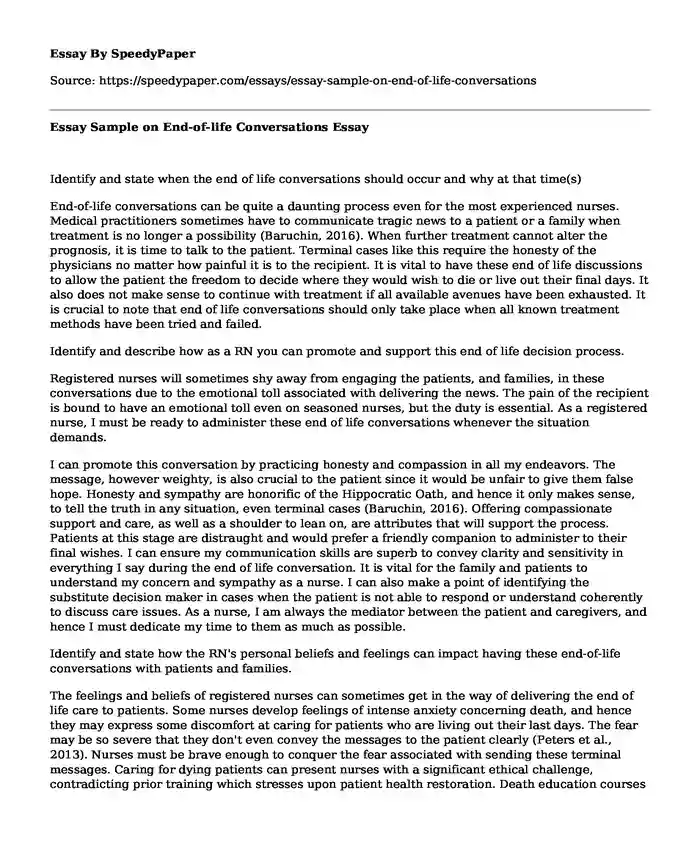
| Type of paper: | Course work |
| Categories: | Nursing care |
| Pages: | 3 |
| Wordcount: | 688 words |
Identify and state when the end of life conversations should occur and why at that time(s)
End-of-life conversations can be quite a daunting process even for the most experienced nurses. Medical practitioners sometimes have to communicate tragic news to a patient or a family when treatment is no longer a possibility (Baruchin, 2016). When further treatment cannot alter the prognosis, it is time to talk to the patient. Terminal cases like this require the honesty of the physicians no matter how painful it is to the recipient. It is vital to have these end of life discussions to allow the patient the freedom to decide where they would wish to die or live out their final days. It also does not make sense to continue with treatment if all available avenues have been exhausted. It is crucial to note that end of life conversations should only take place when all known treatment methods have been tried and failed.
Identify and describe how as a RN you can promote and support this end of life decision process.
Registered nurses will sometimes shy away from engaging the patients, and families, in these conversations due to the emotional toll associated with delivering the news. The pain of the recipient is bound to have an emotional toll even on seasoned nurses, but the duty is essential. As a registered nurse, I must be ready to administer these end of life conversations whenever the situation demands.
I can promote this conversation by practicing honesty and compassion in all my endeavors. The message, however weighty, is also crucial to the patient since it would be unfair to give them false hope. Honesty and sympathy are honorific of the Hippocratic Oath, and hence it only makes sense, to tell the truth in any situation, even terminal cases (Baruchin, 2016). Offering compassionate support and care, as well as a shoulder to lean on, are attributes that will support the process. Patients at this stage are distraught and would prefer a friendly companion to administer to their final wishes. I can ensure my communication skills are superb to convey clarity and sensitivity in everything I say during the end of life conversation. It is vital for the family and patients to understand my concern and sympathy as a nurse. I can also make a point of identifying the substitute decision maker in cases when the patient is not able to respond or understand coherently to discuss care issues. As a nurse, I am always the mediator between the patient and caregivers, and hence I must dedicate my time to them as much as possible.
Identify and state how the RN's personal beliefs and feelings can impact having these end-of-life conversations with patients and families.
The feelings and beliefs of registered nurses can sometimes get in the way of delivering the end of life care to patients. Some nurses develop feelings of intense anxiety concerning death, and hence they may express some discomfort at caring for patients who are living out their last days. The fear may be so severe that they don't even convey the messages to the patient clearly (Peters et al., 2013). Nurses must be brave enough to conquer the fear associated with sending these terminal messages. Caring for dying patients can present nurses with a significant ethical challenge, contradicting prior training which stresses upon patient health restoration. Death education courses help nurses to be able to cope with such testing situations and still perform their duties. The therapeutic relationship between a nurse and patient is supported by the emotional attachment of the former and hence is prone to burn out conditions. Nurses with low-stress tolerance will find it difficult to continue with patients whose conditions are irreversible (Peters et al., 2013).
References
Baruchin, A. (2016). Having the Talk: When Treatment Becomes End-of-Life Care. News.aamc.org. Retrieved 22 February 2018, from https://news.aamc.org/patient-care/article/having-talk-when-treatment-becomes-end-life-care/
Peters, L., Cant, R., Payne, S., O'Connor, M., McDermott, F., & Hood, K. et al. (2013). How Death Anxiety Impacts Nurses' Caring for Patients at the End of Life: A Review of Literature. The Open Nursing Journal, 7, 14-21. http://dx.doi.org/10.2174/1874434601307010014
Cite this page
Essay Sample on End-of-life Conversations. (2022, Mar 21). Retrieved from https://speedypaper.com/essays/essay-sample-on-end-of-life-conversations
Request Removal
If you are the original author of this essay and no longer wish to have it published on the SpeedyPaper website, please click below to request its removal:
- Synthesis Essay Sample on Student Attrition in the USA
- Education Essay Example on Vocabulary Learning
- Free Essay Dedicated to Effective Writing Approach
- Free Esay Sample on Curriculum
- Essay Example about Attention and Consciousness
- US History Essay Example on the American Civil War
- Perpetrators of Domestic Violence Free Essay
Popular categories




